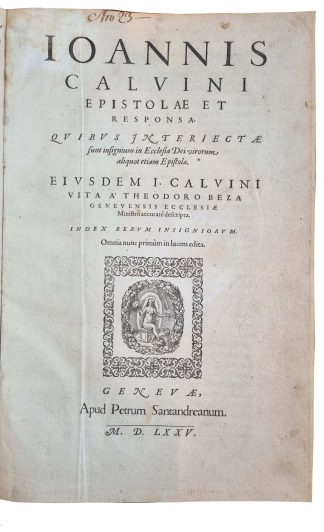CALVIN, Jean; BEZA, Theodore de, ed.
FIRST EDITION
Epistolae et responsa.
Geneva, apud Petrum Santandreanum, 1575.£1,950.00
FIRST EDITION. Tall folio. pp. [30], 5-411, [13]. Roman letter. Woodcut printer’s device to title, decorated initials and ornaments. Title just adhering to ffep at gutter, light age yellowing, intermittent faint water stain at upper gutter, very occasionally to fore-edge, a good copy in early C19 paper boards, all edges sprinkled red, a little scuffed, ms ‘Chr. Fr. Melm. Pastor Falkenpagensis 1864’ to ffep, early C19 ms bibliographical notes to verso, early ms casemark ‘No 23’ to title, ms text revisions following the errata in a later hand throughout, final errata paragraph lightly crossed out.
A good copy of the first edition of Jean Calvin’s correspondence with major personalities of his time. Calvin (1509-1564), a French theologian, contributed to the introduction of the Reformation in France and Switzerland, his most important work being the ‘Institutio Christianae religionis’. After decades of intense correspondence with European intellectuals, Calvin left his personal archive to his disciple Theodore Beza (1519-1605), his designated successor as Protestant leader in Geneva. ‘Epistolae et responsa’ comprises 399 letters – 299 written by Calvin, 100 with his interlocutor’s reply. The work is prefaced by a long biography of Calvin written by Beda himself, appended to which is a complete catalogue, and probably the first official, of Calvin’s published works in Latin and French. Some of the latter, e.g., the pamphlet ‘Ad Hollandum’ (‘À un certain hollandois’), survive in less than a handful of copies. Calvin’s correspondents span Reformed theologians, his own disciples and even royalty. In 1545, he asked Melanchthon to read one of his works and give his opinion; he also wrote to the Queen of Navarre, who was displeased with his ‘De Libertinis’. In 1548, he wrote a long letter in French on Papists and sedition, addressed to Edward Seymour, Protector of England, recently appointed Duke of Somerset. Several letters shed light on Calvin’s own daily struggle, for instance, with raising money, as most alms were donated for the poor alone. In 1555, he wrote to Piperinus that a nobleman he knew died and left him 2000 crowns; however, he wasn’t allowed to use them as the bequest was done ‘sine chirographo’, i.e., without an official legal document. A most interesting work, shedding light on the politics, theology and everyday life of one of the greatest Reformers.
GLN-582. I.A.130.138.



